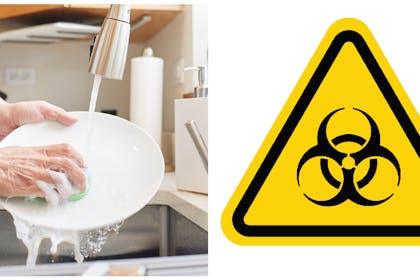The washing up mistake we've ALL been making

'A single sponge can harbour a higher number of bacteria than there are people on Earth.' Eww.
This page contains affiliate links, which means we may earn a small amount of money if a reader clicks through and makes a purchase. All our articles and reviews are written independently by the Netmums editorial team.
Washing dishes by hand is a task very few parents relish ... and it's usually FAR easier just to plonk everything straight in the dishwasher if you have one.
But from your toddler's sippy cup to your preschooler's favourite bowl, you might find yourself reaching for a sponge to get everything sparkling clean.
Unfortunately, it turns out this method could be making your dishes even DIRTIER than before, according to experts.
Speaking to CNN, Trond Møretrø from a Norweigan food research institute, said salmonella and other bacteria often thrive in sponges.
That's because if a sponge is used daily, it rarely gets completely dry after use. The damp conditions of the sponge then provide the ideal place for bacteria to grow – eek!
What's more, although most of the bacteria harboured in sponges can't harm you, using a sponge for washing up increases your risk of salmonella which can make you unwell.
Trond said:
'A single sponge can harbour a higher number of bacteria than there are people on Earth.
'The sponge is humid and accumulates food residues which are also food for bacteria, leading to the rapid growth of bacteria.'
Even if you try to clean the sponge itself, this won't make much difference either according to the scientist.
Replacing your sponge every day is the only way to ensure total hygiene with this method (but who has the money for that?)
Instead, a better option might be opting for a scrubbing brush to do your washing up, since the bristles can dry properly. Trond added:
'Since the brush dries very fast, harmful bacteria will die.
'Also, most brushes have a handle which prevents you from direct hand contact with potentially harmful bacteria, in contrast to sponges.
'I encourage consumers to try a brush instead the next time they need to replace their sponge. Brushes are the better choice to clean dishes, from a hygienic point of view.'
If you need more help getting your house spick and span, try out some of these genius cleaning hacks ...
Or, if you're not sure how to clean your water bottles, an expert has revealed the 'correct' way.
House needs tidying? Try out our room by room cleaning guide. Or, if you're struggling to clean your greasy oven racks, this method changes everything.
Related stories
Mum's fab trick to get the kids to come down for meals – without shouting
Kids as young as SIX being trolled online, parents warned


